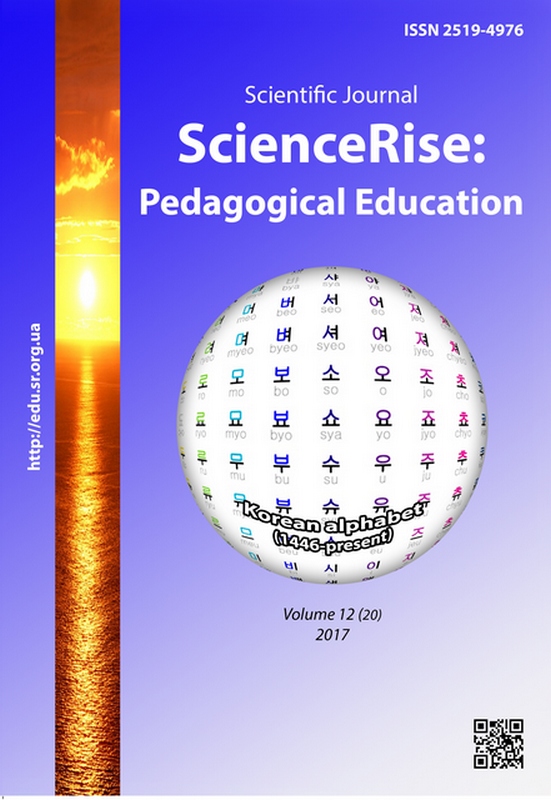Technology of reintegration of boarding school pupils into biological families as a practical component of the system of prevention of social orphanhood
DOI:
https://doi.org/10.15587/2519-4984.2017.119956Keywords:
reintegration of boarding schools pupils, technology, biological family, social orphanhood preventionAbstract
The article reveals importance of activation of processes of deinstitutionalization of orphans and children deprived of parental care, as well as importance of reintegration of boarding schools pupils into biological families as a component of social orphanhood prevention system. Concepts of reintegration, reintegration of orphans and children deprived of parental care and technology are revealed. In the article revealed and presented step by step the technology of reintegration of boarding schools pupils into biological families. Thus it was indicated that process of reintegration of boarding schools pupils into biological families may be begun by legislative decision or by initiative of returning a child and technologically it contains following stages:
1) An initiative, appeal to Service of Children,
2) Primary diagnosis of parental potential in a family and environment,
3) Diagnosis of child’s readiness to reintegration,
4) Formation of interdepartmental commission and making a decision about possibility of reintegration, appointment of social support,
5) Complex diagnosis of family’s and child’s needs,
6) Meeting of interdepartmental commission and making a decision about beginning of reintegration procedure, creating a plan of social reintegration of child,
7) Realization of the plan, granting social support,
8) Diagnosis of sides’ readiness to returning a child into biological family,
9) A decision to return a child, revision and addition of plan of working with a family,
10) Social support of a family with a child,
11) Ending of social support, closing a case, post-monitoring
References
- On Approval of the Concept of the State Social Program "National Action Plan for the Implementation of the UN Convention on the Rights of the Child" for the period up to 2021 (2017). Cabinet of Ministers of Ukraine, No. 230-p. Available at: http://zakon3.rada.gov.ua/laws/show/230-2017-%D1%80
- Zvierieva, I. D., Petrochko, Zh. V. (Eds.) (2007). Integrated social services: theory, practice, innovations. Kyiv: Phoenix, 528.
- Zvierieva, I. D., Petrochko, Zh. V. (2008). Preventing the institutionalization of early childhood. Innovative technologies of social work on prevention of refusal from newborns. Kyiv: Century, 224.
- Ternovets, O. M. (2015). Accompaniment of children of the "risk group of orphanhood" as the newest technology of social and pedagogical work. Bulletin of the Taras Shevchenko National University of Lugansk: Pedagogical sciences, 2 (291), 151–157.
- Lopatchenko, I. M. (2017) State administration of prevention of social orphanhood at the regional level. Kharkiv, 236.
- Volodina, Yu. A. (2009). Socio-pedagogical reintegration of orphans and children left without parental care in the conditions of an innovative educational environment. Bryansk, 203.
- Volodina, Yu. A., Matyash, N. V., Sidorina, M. S. (2012). Deinstitutionalization of orphans in an open socio-cultural space. Moscow: Pedagogical Society of Russia, 256.
- Modernization of the system of prevention of social orphanhood and de-institutionalization of orphans and children left without parental care (2011). Moscow: United Nations Children's Fund (UNICEF), 110.
- Savchenko, D. D., Shulga, T. I. (2017). Social Relationships in Orphan Adolescents with Different Experiences of Living in Families. Psychological Science and Education, 22 (2), 75–86. doi: 10.17759/pse.2017220207
- Osipova, I. I. (2009). The system of prevention of social orphanhood. Nizhny Novgorod, 64.
- On Fundamentals of Social Protection of Homeless Persons and Homeless Children (2005). Verkhovna Rada of Ukraine, No. 2623-IV. Available at: http://zakon3.rada.gov.ua/laws/show/2623-15
- Tsyba, V. T. (2000). Sociology of personality: systematic approach (socio-psychological analysis). Kyiv: MAUP, 152.
- Bezpalko, O. V. (Ed.) (2006). Community Activation Technologies. Kyiv: Science World, 95.
- Blauberg, I. V., Sadovsky, V. N., Yudin, E. G. (2010). System approach. New philosophical encyclopedia. Moscow: Thought, 736.
- Holostova, E. I. (2017). Social work with maladjusted children. Moscow: Publishing and trading corporation "Dashkov and Kо", 272.
- Questions of the activities of the guardianship and trusteeship bodies related to the protection of the rights of the child (2008). Resolution of the Cabinet of Ministers, No. 866. Available at: http://search.ligazakon.ua/l_doc2.nsf/link1/KP080866.html
- On approval of forms of accounting for social services for families (individuals) who are in difficult living conditions (2014). Ministry of Social Policy of Ukraine, No. 450. Available at: http://search.ligazakon.ua/l_doc2.nsf/link1/RE25853.html
Downloads
Published
How to Cite
Issue
Section
License
Copyright (c) 2017 Larysa Kalchenko

This work is licensed under a Creative Commons Attribution 4.0 International License.
Our journal abides by the Creative Commons CC BY copyright rights and permissions for open access journals.
Authors, who are published in this journal, agree to the following conditions:
1. The authors reserve the right to authorship of the work and pass the first publication right of this work to the journal under the terms of a Creative Commons CC BY, which allows others to freely distribute the published research with the obligatory reference to the authors of the original work and the first publication of the work in this journal.
2. The authors have the right to conclude separate supplement agreements that relate to non-exclusive work distribution in the form in which it has been published by the journal (for example, to upload the work to the online storage of the journal or publish it as part of a monograph), provided that the reference to the first publication of the work in this journal is included.







